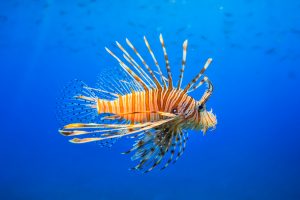Relaxing on a beach in Italy may never be the same again – for the first time, a highly venomous lionfish has been found in Italy

These lionfish have multi-coloured frills and striped bodies making them one of the most vibrant creatures in the sea, but they are also among the most venomous. They have sharp spines that are coated in a poisonous mucus that is harmful to humans as well as to other fish.
Native to the tropical waters of the Indian and Pacific Oceans, they have steadily spread to other parts of the world, having been accidentally or deliberately introduced.
Now a 12cm-long specimen has been spotted in the Vendicari marine reserve in the south-east of Sicily. The fish, described by experts as “venomous pests”, were already present in the eastern Mediterranean but this is the first time one has been sighted in Italian waters.
The discovery was made by marine biologists from Italy’s Institute for Environmental Protection and Research, the Italian National Research Council and the American University of Beirut.
“This is the first record of this notorious invasive species in Italian waters. Given its large size, conspicuous appearance, and venomous spines, it is critical to involve informed citizen scientists in tracking the spread of this species and to develop means to manage or adapt to its presence in the Mediterranean Basin,” the researchers wrote in a paper published in BioInvasions Records, a scientific journal.
The species has spread quickly in the Mediterranean in the last 20 years.

They reproduce rapidly and have an unquenchable appetite, the two factors could cause the decimation of native reef species. “Invasive lionfish can reach very high population densities and can greatly alter ecosystem structure and function, mainly through predation on small fishes,” the scientists said.
Lionfish stings are very unlikely to be fatal to humans, but they are extremely painful. If a spine pierces a person’s flesh, neurotoxic venom is injected into the wound. That can cause extreme pain, nausea, vomiting and allergic reactions. The pain is known to last from a few hours to a few days, depending on the person.
“It won’t kill you, but it’ll make you wish you were dead,” a dive instructor in Florida told National Geographic.
The recommended treatment is to immerse the affected area of the body into hot water for at least half an hour.
The more positive news for holidaymakers heading to Sicily this summer is that lionfish use their poisonous spines as a defence, rather than as an attack tool. Swimmers, snorkelers and divers need only keep a safe distance from the species to reduce the risk of being stung.
This story first appeared on The Telegraph
